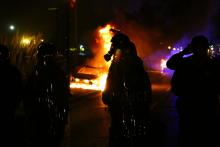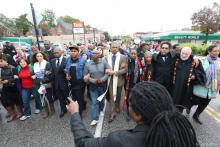ferguson mo

“Some of those protestors were right,” said Attorney General Eric Holder, as he released the Justice Department’s report on the police department in Ferguson, Mo. The report should be read by anyone who believes in racial justice and reconciliation, because it shows us what we are still up against in 2015, 50 years after the Selma march. This is not a post-racial America, especially in regard to our policing and criminal justice systems. Ferguson has become a teaching parable for the nation.
After a detailed and thorough investigation over many months, the devastating report revealed a police force and court system in Ferguson that proves true virtually everything young protestors and local residents have been saying since the shooting of Michael Brown last August.
The Ferguson Police Department replaced its mission of public protection with revenue generation by extracting money from the black residents of their town, using methods that the Justice Department said “may be unlawful.” The report painfully and painstakingly reveals unconstitutional and consistently abusive policing aimed at balancing the city budget on the backs of its poorest and black citizens. The Ferguson police went beyond even racial profiling to direct racist exploitation for a profit, with police apparently more concerned about “ fill[ing] the revenue pipeline” than protecting public safety. The use of traffic stops, citations, court appearances, fines, and even arrests that were specifically targeted at black residents revealed a profound contempt for black people with racial slurs and abuse a daily occurrence. Disgusting racist jokes, even aimed at the president and the first lady, circulated in e-mails from police supervisors and court officials. One joked about a black mother getting a crime prevention award for having an abortion.

Could it be that the crescendo of dissention is divinely synched to yet again heighten disruptive unease among the status quo? Could it be that the promise of Emmanuel — "God is with us" — as proclaimed by the heavenly host, but feared by powerful elite, is unavoidably linked through the eternal truth — such that even the Church universal cannot celebrate one and avoid the other? Could it be that through Advent, we are called to acknowledge the humanity and parity of personhood, rather than rest in the laurels of privilege? The anger of youthful Ferguson protests was marginalized and dubbed as riots, but could it be that this Advent response manifested in expanded multiethnic solidarity is of divine intent to raise challenge to elitism and to demand respect for people of color as equals rather than as patronized subordinates? Could it be that whether or not the media chooses to ignore the connection, the Advent message for those with ears to hear is that perpetrators of brutality, the comfortable protectors of privilege, and the self-serving pundits of power that tried to nullify the everlasting promise were unsuccessful then and now? Could it be by divine design that unknown names, stolen lives, are now divinely lifted to eternal and global recognition as sacrificial symbols so that truth could come to light?

Thousands of people from around the country came to Ferguson, Mo., for a “weekend of resistance.” But for faith leaders it was a weekend of repentance. Twenty of us were arrested in Ferguson yesterday for an act of repentance.
I went to Ferguson as a faith leader but, in particular, as a white faith leader. Because the great disparity between how differently young black lives are treated in our criminal justice system than young white lives is a fundamental injustice that must not only be left to black faith leaders to raise up. Repentance must begin in the white Christian community for tolerating this offense to our black brothers and sisters and, ultimately, this offense to God. Let me be as honest as I can be. If white Christians in America were more Christian than white, black parents could feel safer about their children. It’s time for us white Christians to repent — turn around and go in a new direction.
Repentance is a powerful theme throughout the Bible. But its meaning is often not well understood. Repentance is not about being sorry or just feeling guilty. It is about turning in a new direction. The biblical word for repentance in the original Greek is metanoia, which means you are going in the wrong direction, and it’s time to turn right around.
In the case of Ferguson, repentance means more than merely acknowledging the tragic death of an unarmed 18-year-old African-African man named Michael Brown on Aug. 9 — shot and killed by a white police officer named Darren Wilson. Repentance means more than lamenting the loss of another young black man or being sympathetic to his grieving mother. True repentance means changing the direction of the practices and policies that led to his death and so many others.

Editor's Note: The following transcript is from a homily given in Christ Chapel at Gustavus Adolphus College in St. Peter, Minn. As part of the “From Segregation to Integration through Conversation” faith and learning series, the text for the day was 1 Corinthians 12:14-26.
The color of my skin is white. I am Caucasian. I am white, from head to toe, in case you had not noticed. It is quite possible that you had not noticed, because in case you have not noticed, most days in this place, most all of us have skin that is white. And as those of us that experience winters in Minnesota know better than most, in the midst of a “white out” it is difficult to notice anything that is not white.
While there are some special days with some special circumstances and some special exceptions, we in this place tend to be white people surrounded with other white people. Because the fact of the matter is that most white people in most places tend to have social circles that are mostly filled with other white people.
As was recently reported by the Public Religion Research Institute’s 2013 American Values survey, when respondents were asked to identity as many as seven people with whom they had discussed important matters in the six months prior to the survey, the results revealed just how segregated white social circles actually are. As reported by the study, the social circles of white people in the United States are 91 percent white. In addition, the analysis also showed that over 75 percent of white people reported exclusively white social circles, without any minority presence whatsoever.
All together, the Public Religion Research Institute showed the sociological fact that, even in an increasingly diverse multi-cultural nation, birds in the United States with white feathers — such as my own — continue to flock together. In other words, contrary to the common cliché often given in response to these difficult topics, when it comes to white American people, the facts reveal that "some of our best friends" simply are not black.

I’ve been calling it the Summer of Helplessness.
From the conflict in Gaza that has left more than 1,000 civilians dead, to the downing of Malaysia Airlines Flight 17 over the skies of Ukraine, to the Ebola breakout getting worse by the day, to the shooting of yet another unarmed black teenager here in the U.S., the news of late is enough to make a person feel paralyzed with helplessness and despair. My prayers these days are of the tired, desperate sort: How long, O Lord? Will you hide your face from us forever?
But when it comes to violence and oppression, we are rarely as helpless as we think, and this is especially true as the events unfolding in Ferguson force Americans to take a long, hard look at the ongoing, systemic racism that inspired so many citizens to protest in cities across the country this week.
I’ve heard from many of my white friends and readers who say they aren’t sure how to respond to the anger and grief they are watching on TV or hearing from their black friends. They want to be part of the solution but don’t know where start. They may even feel a little defensive when they hear people talking about white privilege or inaction on the part of white Christian leaders. I’m in the process of learning too, but as I’ve listened to people of color whose opinions I trust, I’ve heard them issue several calls to action we can all heed.